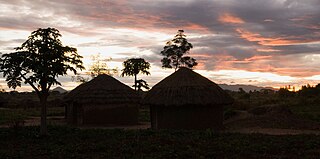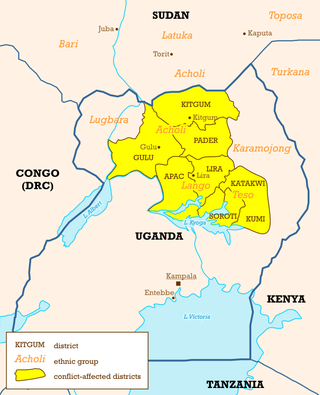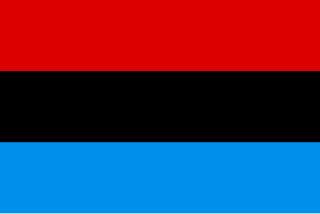
The Lord's Resistance Army insurgency is a conflict involving the Lord's Resistance Army against the government of Uganda. Following the Ugandan Civil War, militant Joseph Kony formed the Lord's Resistance Army and launched an insurgency against the newly installed President Yoweri Museveni. The stated goal was to establish a Christian state based on the Ten Commandments. Currently, there is low-level LRA activity in eastern areas of the Democratic Republic of the Congo and the Central African Republic. Kony proclaims himself the 'spokesperson' of God and a spirit medium.
Joseph Rao Kony is a Ugandan militant and warlord who founded the Lord's Resistance Army (LRA), designated as a terrorist group by the United Nations Peacekeepers, the European Union, and various other governments including the United Kingdom and United States of America.

Pader District is a district in Northern Uganda. It is named after Pader, the chief municipal, administrative and commercial town in the district, where the district headquarters are located.

Gulu is a city in the Northern Region of Uganda. It is the commercial and administrative centre of Gulu District.

The start of the period 1994 to 2002 of the Lord's Resistance Army insurgency in northern Uganda saw the conflict intensifying due to Sudanese support to the rebels. There was a peak of bloodshed in the mid-1990s and then a gradual subsiding of the conflict. Violence was renewed beginning with the offensive by the Uganda People's Defence Force in 2002.
The period from 2000 to 2006 of the Lord's Resistance Army insurgency in northern Uganda begins with the assault of the Uganda People's Defence Force (UPDF) upon LRA strongholds in South Sudan. This in turn led to a series of retaliatory attacks by the Lord's Resistance Army of an intensity not seen to since the mid-1990s. International awareness of the conflict gradually grew and in September 2005, the International Criminal Court issues warrants for the arrest of senior LRA commanders, including Joseph Kony.
The Aboke abductions were the kidnapping of 139 secondary school female students from St. Mary's College Secondary school by rebels of the Lord's Resistance Army (LRA) on 10 October 1996, in Aboke, Kole District, Uganda. The deputy head mistress of the college, Sister Rachele Fassera of Italy, pursued the rebels and successfully negotiated the release of 109 of the girls. The Aboke abductions and Fassera's dramatic actions drew international attention, unprecedented at that time, to the insurgency in northern Uganda. A book titled "Aboke Girls" was written by Els De Temmerman about the abductions and effects of the abductions.
Aboke is a town in the Kole District of the Northern Region of Uganda. It was the location of the Aboke abductions in October 1996.

The Juba talks were a series of negotiations between the government of Uganda and the Lord's Resistance Army rebel group over the terms of a ceasefire and possible peace agreement. The talks, held in Juba, the capital of autonomous Southern Sudan, began in July 2006 and were mediated by Riek Machar, the Vice President of Southern Sudan. The talks, which had resulted in a ceasefire by September 2006, were described as the best chance ever for a negotiated settlement to the 20-year-old war. However, LRA leader Joseph Kony refused to sign the peace agreement in April 2008. Two months later, the LRA carried out an attack on a Southern Sudanese town, prompting the Government of Southern Sudan to officially withdraw from their mediation role.
Labora Farms was founded as a project with the help of the Northern Ugandan Social Action Fund (NUSAF), a government organization in Uganda with $100 million of funding from the World Bank. The goal of NUSAF is to help local communities in the 18 districts of northern Uganda that have been ravaged by conflict over the last 20 years. This money is given directly to members of the community so they can invest in infrastructure and training for long-term development.

The Lord's Resistance Army (LRA) is a Christian extremist organization operating in Central Africa and East Africa. Its origins were in the Ugandan insurgency (1986–1994) against President Yoweri Museveni, during which Joseph Kony founded the LRA in 1987.
The 2008–2009 Garamba offensive started on 14 December 2008, when joint Ugandan, DR Congolese and Southern Sudanese forces launched a botched military attack against the Lord's Resistance Army (LRA) in the Garamba region of DR Congo.

Ndoromo is a city in the northeastern regions of the Haut-Uele Province in the Democratic Republic of the Congo, adjacent to the border with South Sudan.
Acholi nationalism is a political ideology that seeks self-determination by the Acholi people.

Paper to Pearls is a micro-enterprise initiative of Voices for Global Change, a 501(c)(3) non-profit based in Alexandria, Virginia. Paper to Pearls works with women in the Internally Displaced Persons (IDP) camps in northern Uganda. The women create jewelry by hand-rolling beads from recycled paper, and Paper to Pearls markets and sells the jewelry principally in the United States, but also, via retailers and its website, in countries throughout the world.

The Makombo massacre took place from 14 to 17 December 2009 in the Haut-Uele District of Democratic Republic of the Congo in the village and region of Makombo. Human Rights Watch (HRW) believes the attacks, which killed 321 people, were perpetrated by the Lord's Resistance Army (LRA), which denied responsibility.
Ikotos County is an administrative area in the Eastern Equatoria state of South Sudan with headquarters in the town of Ikotos. The people, who live in the county's area by subsistence agriculture and cattle herding, are poverty-stricken. Years of civil war have made violence commonplace: most people have experienced the murder of a close family member. In 2009, AK-47 rifles were used in 42 per cent of killings.
StGiNU is an advocacy group formed in the beginning of 2005 by Ugandans living in the United Kingdom. At that time, the situation in the concentration camps in Northern Uganda was claiming lives more than cross fire casualties. In the same year 2005, the Ugandan World Health Organization reported that there were 5000 excess deaths per week due to camp conditions alone.

The Acholi people are a Nilotic ethnic group of Luo peoples, found in Magwi County in South Sudan and Northern Uganda, including the districts of Agago, Amuru, Gulu, Kitgum, Nwoya, Lamwo, Pader and Omoro District. The Acholi were estimated to number 2.3 million people and over 45,000 more were living in South Sudan in 2000.

The Barlonyo Memorial Site is also known as Barlonyo Monument or Barlonyo Massacre site is a mass grave where the 301 civilian who were massacred by the Lord Resistance Army on 2004-02-21 were buried. The monument was raised in memory of the people who were man slaughtered.










